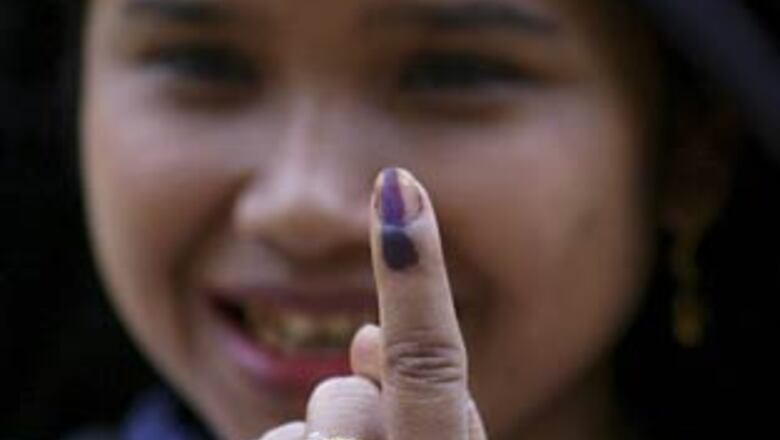
views
New Delhi: Round one of the 2009 Lok Sabha elections ended on Thursday with millions queuing up in 17 states and union territories to vote in a new government amid Maoist violence that marred the democratic exercise in several places and left at least 17 dead.
The world's largest democratic exercise began early at 0700 hrs IST and ended at most places at 1700 hrs IST. A majority of the states reported moderate turnout despite the Maoist attacks on polling centres and security personnel.
People voted in 124 constituencies to pick a new 545-seat Lok Sabha in the first step of a four-phased exercise that is widely expected to throw up a split verdict. The Maoist violence affected a dozen constituencies.
About 143 million of India's 714 million voters were eligible to exercise their franchise in the first of five rounds in 185,552 polling centres. A total of 1,715 candidates were in the fray, with over 300,000 electronic voting machines used.
Tens of thousands of election staff and security personnel kept vigil as people voted in all the constituencies of Kerala, Arunachal Pradesh, Meghalaya, Mizoram, Nagaland, Chhattisgarh, Andaman and Nicobar Island and Lakshwadeep. Andhra Pradesh, Assam, Bihar, Uttar Pradesh, Jammu and Kashmir, Maharashtra, Manipur, Orissa and Jharkhand saw partial voting.
But it was a bloody start to the ambitious exercise with Bihar, Chhattisgarh, Orissa, Jharkhand and Maharashtra seeing violence and intimidation as Maoist guerrillas tried to implement their election boycott through the barrel of the gun.
At least 17 people were killed as cadres of the outlawed Communist Party of India-Maoist, which seeks to carry out an agrarian-based revolution, targeted polling officials and security personnel across the insurgency hit states.
Landmine blasts in Chhattisgarh and Jharkhand saw 14 people getting killed. In Jharkhand's Latehar area, seven Border Security Force (BSF) personnel and two others heading to an election centre were killed when their bus was blown up.
In neighbouring Chhattisgarh, five polling officials died when Maoists detonated a landmine in Rajnandgaon district. A paramilitary trooper was shot dead in an exchange of bullets in the Maoist stronghold Dantewada.
In adjoining Bihar, a policeman and a Home Guard were killed when over a dozen Maoists opened fire at a polling station in Gaya district.
Reports of gun battles, booths being raided, voters being attacked and electronic voting machines being torched came in from several places in the affected states.
PAGE_BREAK
But voters braved it all at the end of the day.
In Andhra Pradesh, once a Maoist bastion, there was 60-65 percent voter turnout, 65 percent in the three parliamentary constituencies of Assam and 60-70 percent in Mizoram, Nagaland, Meghalaya and Arunachal Pradesh, also in the northeast. Manipur was lower at 40 to 50 percent.
In violence-hit Chhattisgarh, Jharkhand and Bihar, about 50 percent of the voters turned to cast their franchise.
Long queues were seen outside booths in Kerala with officials estimating that the turnout would be about 60 percent. It was highest in Ernakulam with 67.5 percent and surprisingly low in Thiruvananthapuram, where the Congress fielded star debutant, former UN under-secretary general Shashi Tharoor, with 45.4 percent.
With 124 of 543 seats going to the polls, the day was decisive for the main political parties battling for power with several key leaders in the fray.
One of them was Railway Minister and Rashtriya Janata Dal (RJD) chief Lalu Prasad, who accused the rivals of intimidating voters in his constituency in Saran in Bihar.
Cabinet minister and Nationalist Congress Party (NCP) leader Civil Aviation Minister Praful Patel said in his constituency Bhandara-Gondia in Maharashtra: "We are with the Congress as alliance partners. That does not stop us from having good relations with the Left. In fact, we may need them later."
Finally, Thursday was all about the struggle to reach the coveted seat of power in Delhi.
As Defence Minister and Congress leader A.K. Antony said: "Gone are the days of a single party ruling the country. Hence, even though there are secular parties contesting against us in states, when it comes to forming a government in Delhi we will seek the support of all secular parties."
And this is how BJP general secretary Arun Jaitley put it: "The way the campaign progressed and looking at the voting trends in all the states where we are in strength, we are going to improve our performance."
The exercise was also about the people and their determination to vote, no matter what.
Like Kamla Devi, 102, who came to vote at Gurah Brahamana in Jammu region. It was the 20th time she was doing so and the canny voter refused to disclose who she had supported.
But all will be told on May 16 when the millions of votes will be counted.




















Comments
0 comment